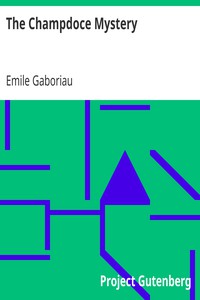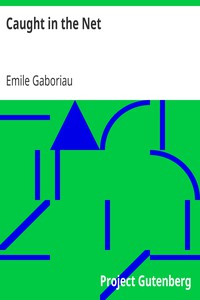The Champdoce Mystery, Emile Gaboriau [ebooks that read to you .TXT] 📗

- Author: Emile Gaboriau
Book online «The Champdoce Mystery, Emile Gaboriau [ebooks that read to you .TXT] 📗». Author Emile Gaboriau
“My father,” thought he, “must be half mad with passion.”
And Norbert was not wrong in his opinion. When the Duke, as usual, took his place at the table, at which the farm laborers ate their meals, not one of them had the courage to make a single observation. Every one knew what a serious altercation had taken place between father and son, and each one was devoured by the pangs of ungratified curiosity.
As soon as the meal was concluded, the Duke called an old and trustworthy servant, who had been in his employment for over thirty years.
“Jean,” said he, “your young master is locked in the yellow room. Here is the key. Take him something to eat.”
“Very good, your Grace.”
“Wait a little. You will spend the night in his room and keep a strict watch upon him. He may design to make his escape. If he attempts it, restrain him, if necessary, by physical force. Should he prove too strong for you, call to me; I shall be near, and will come to your aid.”
This unexpected precaution upon the Duke’s part upset all Norbert’s plans of escape. He endeavored to persuade Jean to allow him to go out for a couple of hours, giving his word of honor that he would return at the expiration of that time. Prayers and menaces, however, had no effect. Had the young man gazed from the window, he would have seen his father striding moodily up and down the courtyard, with the thought gnawing at his heart that perhaps after all these many years of waiting his plans might yet be frustrated.
“There is a woman at the bottom of all this,” said he to himself. “It is only woman’s wiles that in this brief space of time would effect so complete a change in a young man’s disposition. Besides, he would not have so obstinately declined to listen to the proposal I made him had not his affections been engaged elsewhere. Who can she be? and by what means shall I find her out?”
It would be absurd to question Norbert, and the Duke was excessively unwilling to institute any regular inquiry into the matter. He passed the whole night in gloomy indecision, but towards morning an inspiration came to him which he looked upon as a special interposition of Providence.
“Bruno,” he exclaimed with a mighty oath. “The dog will show me the place that his master frequents and perhaps lead me to the very woman who had bewitched him.”
The brilliant idea soothed him a great deal, and at one o’clock he took his seat as usual at the head of the table, and ordered food to be taken up to Norbert, but that none of the measures for his safe custody were to be relaxed.
When he thought the moment was a favorable one, he whistled to Bruno, and, though the dog rarely followed him, yet in the absence of his master, he condescended to accompany the Duke down the avenue to the front gates. Three roads branched off from here, but the dog did not hesitate for a moment, and took the one to the left, like an animal who knew his destination perfectly well. Bruno went ahead for nearly half an hour, until he reached the exact spot where Diana had met with her accident. He made a cast round, but finding nothing, sat down, clearly saying,—
“Let us wait.”
“This, then,” muttered the Duke, “is the place where the lovers have been in the habit of meeting each other.”
The place was a very lonely one, and, standing on the rising ground, commanded a view of the country for a long way round.
The Duke noticed this, and took up a position where the trunk of a giant oak almost concealed him from observation. He was delighted at his sagacity, and was almost in a good humor; for now that he had reflected, the danger did not seem by any means so great, for to whom could Norbert have lost his heart? To some little peasant girl, perhaps, who, thinking that the lad was an easy dupe, had tried to induce him to marry her. As these thoughts passed through the Duke’s brain, Bruno gave a joyous bark.
“Here she is,’ muttered he, as he emerged from his hiding place, and at that moment Diana de Laurebourg made her appearance; but as soon as she saw the Duke she uttered a faint cry of alarm. She was inclined to turn and fly, but her strength failed her, and, extending her hands, she grasped the boughs of a slender birch tree that grew close by, to prevent herself from falling. The Duke was quite as much astonished as the young lady. He had expected to see a peasant girl, and here was the daughter of the Marquis de Laurebourg. But anger soon succeeded to surprise; for though he might have had nothing to fear from the peasant, the daughter of the Marquis de Laurebourg was an utterly different antagonist. He could not rely upon aid from her family, as, for all he knew, they might be aiding and abetting her.
“Well, my child,” began he, “you do not seem very glad to see me.”
“Your Grace.”
“Yes, when you come out to meet the son, it is annoying to meet the father; but do not blame poor Norbert, for I assure you he is not in fault.”
Though Mademoiselle de Laurebourg had been startled at first, she was possessed of too strong a will to give in, and soon recovered her self-possession.
She never thought to screen herself by a denial of her reasons for being on the spot, for such a course she would have looked on as an act of treacherous cowardice.
“You are quite right,” answered she. “I came here to meet your son, and therefore you will pardon me if I take my leave of you.”
With a deep courtesy she was about to move away, when the Duke laid a restraining grip upon her arm.
“Permit me, my child,” said he, endeavoring to put on a kind and paternal tone,—“let me say a few words to you. Do you know why Norbert did not come to meet you?”
“He has doubtless some very good reason.”
“My son is locked up in a room, and my servants have my orders to prevent his making his escape by force, if necessary.”
“Poor fellow! He deserves the deepest commiseration.”
The Duke was much surprised at this piece of impertinence, as he considered it.
“I will tell you,” returned he in tones of rising anger, “how it comes that I treat my son, the heir to my rank and fortune, in this manner.”
He looked savagely angry as he spoke, but Diana answered negligently, “Pray go on; you quite interest me.”
“Well then, listen to me. I have chosen a wife for Norbert; she is as young





Comments (0)